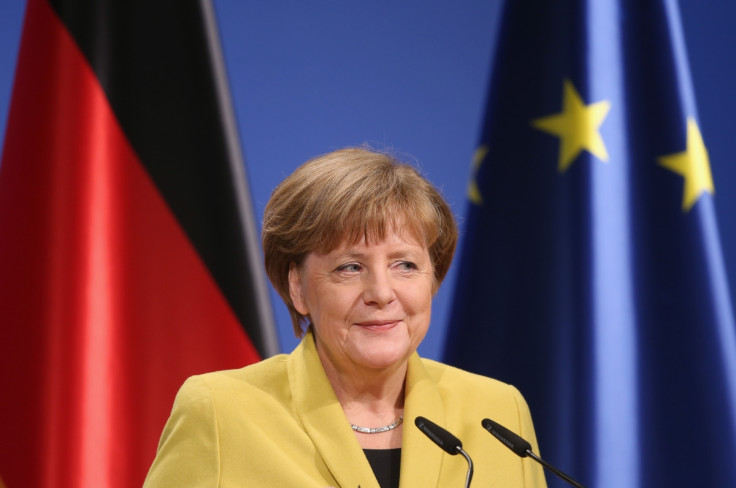EU referendum: We know the risks of leaving, but Britain answers to Germany if we stay

Perhaps it's just as well that the Luton Girls' Choir no longer exists. Otherwise they would surely have been roped in to add their voices to the dismal chorus of warnings about the supposedly dire consequences of leaving the EU. After all, the Downing Street spin machine has rounded up almost everybody else, whether they had anything sensible to say or not.
Here they are then, the great and the good, the wise and the wonderful, all singing obediently from the same hymn-sheet. The whole pack of them sound uncannily like a convention of speak-your-weight machines. There's Barack from the White House and Christine from the IMF. Mark from the Bank of England and George from the Treasury, big bananas from NATO and big businessmen from the CBI, all in unison, all word perfect, almost as though they don't dare deviate from the defeatist script written for them: Britain's too small, too poor, too weak, too weedy and clapped out to survive separation from the warm embrace of Brussels.
Well, it's a point of view. Only a fool would pretend that a Brexit could be achieved without consequences. Behind the exaggerations and hyperbole – not to mention the near hysteria of David Cameron's warnings of war (which he'll surely regret, once he's calmed down) – there's undeniably a need to take a long, hard look at every possible outcome.
But here's a curious thing. Amid all the all the wails and hand-wringing over the risks of leaving the EU, there's hardly a word uttered about the risks of remaining. Apparently, the dangers aren't worth a mention. Yet Europe is in the throes of convulsive change – and not necessarily for the better. So why is all this ignored in the Government's 'information' programme? I wonder.
Perhaps the answer lies in Mr Cameron's embarrassment over the utter failure of his attempt to renegotiate our relations with Brussels. Remember his tough talk when it all began? He was going to demand an emergency brake on immigration. He even gave the impression that he'd walk away from the EU if he didn't get his way.
Yet as we know from the lips of former Tory leader Iain Duncan Smith, the PM caved in at the first whiff of grapeshot. All it took was a stern 'nein' from Germany's Chancellor Merkel and Mr Cameron went meekly away to revise his demands. Instead of an emergency brake, he settled instead for a temporary – and ineffective – curb on migrant benefits.
So we already know two things about the consequences of a 'Remain' vote on June 23. One: our borders remain wide open to anyone from the EU who cares to come, no matter what the strains on our housing, health and education services. Two: Germany now calls all the shots, no matter what the rest of Europe thinks.
The risks of one country being so overwhelmingly dominant should be obvious.
Giving the brush-off to Mr Cameron was only the latest example. But it was Merkel's response to the surge of refugees fleeing the horrors of the Middle East that truly demonstrated German power.
Apparently off the top of her head, without even a pretence of consultation, she announced that Germany was throwing open its borders – a policy that tore up a binding European agreement based on the Dublin Convention of 1997 where all refugees must seek asylum in the first EU country they enter.
In some ways it's hard not to admire her generosity and decency in an overwhelming humanitarian crisis. But what happens if a future German Chancellor – perhaps not nearly as nice as Angela Merkel – also tears up an agreement, this time for reasons that are far less admirable? The risks of one country being so overwhelmingly dominant should be obvious.
The Euro itself is an economic catastrophe, inflicting high unemployment and sluggish growth on millions of people who would be much better off if they had their own national currencies.
But nothing can prevent it now. Because of the euro – a much weaker currency than the old mark – German industrialists can export their products at a huge competitive advantage over the rest of the eurozone. That just adds to the economic miseries inflicted on countries such as Greece and Italy, while entrenching Germany's power.
The euro itself, it hardly needs saying, is an economic catastrophe, inflicting high unemployment and sluggish growth on millions of people who would be much better off if they had their own national currencies.
So how do the Eurocrats respond? Why, with proposals for more Europe, more centralisation, more regulation... but not quite yet. Not until Britain's referendum is safely out of the way. And then? Once the poor old Brits have been bullied and bedazzled into doing as they're told, the great imperial project can go right ahead. As planned.
Deeper fiscal and political union? Already on the agenda. Expect a new treaty by 2020/2021. Plans to impose VAT on children's clothes? Postponed, but only until after 23 June. Proposals to ban efficient kettles and toasters? Yep, they're postponed too. For now. Plans for a new European army that may one day absorb Britain's forces? They're well in hand, as we know from leaks in Berlin.
The risks should be obvious, even to the most starry-eyed of Remainers. So why aren't they acknowledged?
Perhaps our prime minister might care to consider what happened after the last referendum, in 1975. Voters said Yes to Europe on that occasion, but have been simmering with resentment ever since over the way they were patronised and misled by the political establishment. What does he think it will do to his reputation, if they feel betrayed again?
Michael Toner is a former Fleet Street political editor and co-author of a series of Bluffers' Guides on Europe. Follow him on Twitter @Toner_Mick
© Copyright IBTimes 2025. All rights reserved.






















